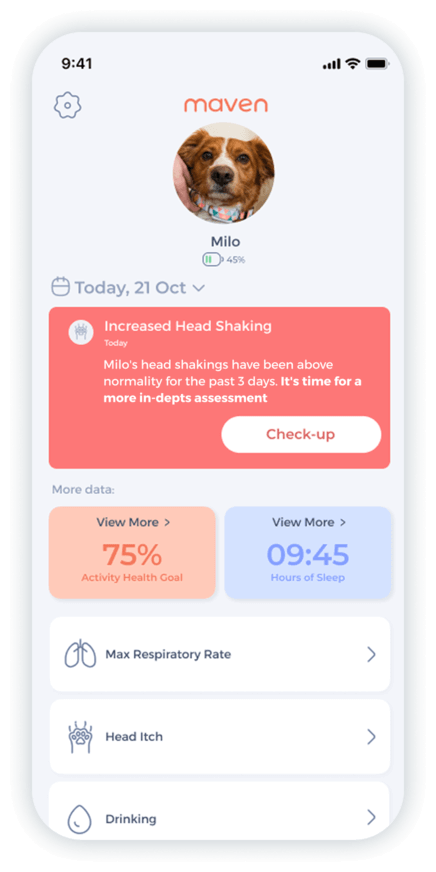Can Dogs Have Allergies? Yes – Learn To Control Them
Spring is a beautiful season, with blooming flowers, chirping birds, soft breezes full with fragrances… And allergies, a whole bunch of allergies! You might be surprised to learn that dogs aren’t immune to them. Can dogs have allergies at all? Yes, they can, and not only from pollens or dust like in Spring. Food allergies and sensitiveness to flea bites can also trigger severe rashes and itchy skin!
- Dogs can suffer from allergies due to various triggers including pollen, dust, food, and flea bites.
- Common symptoms include rashes, itchiness, red eyes, and ear infections.
- Regular cleaning and vet visits are essential for managing allergies in dogs.
- Maven technology assists in tracking dog health and detecting allergy flare-ups early.
- Food allergies require strict dietary management to identify and eliminate triggers.
Can dogs have allergies?
Dog allergies are much like human’s when it comes to triggers and symptoms. Some breeds like Terriers, Retrievers, Pugs and Bulldogs, for example, are more likely to have this sort of reaction, but any dog can develop allergies regardless of their breed.
The most common triggers are the already known offenders. Grass, pollens, dust, feathers, smoke, dander, cleaning products and perfumes may give your dog a sneezing fit. However, canines can also develop an allergy to some drugs, food, dog shampoo, plastic and even fleas.
“I got the Maven sensor for my 14-year-old Chihuahua mix with heart and trachea issues. It gave me back peace of mind – I can track her RRR, BPM, drinking, and activity anytime and know instantly if something’s wrong. Highly recommend!”

★★★★★
Chiara De Luca
Titti
What are the symptoms of dog allergies?
The most common symptoms of dog allergies include skin rashes, generalized or localized itchiness, red and itchy eyes and even some sneezing and a running nose.
Ear infections and red and swollen paws are usually sign of environmental and food allergies.
Regardless of the symptom, your dog is likely to scratch and lick themselves or chew on some body parts more often in an attempt to soothe the itchiness. You should attend to your buddy as soon as possible before they can inflict any self-harm.
Technology is changing the game
Thanks to the advances of technology, it’s easier than ever to have a complete understanding of our pets’ well-being. A service like Maven can be a big help, granting you peace of mind by detecting signs of developing conditions early on – including allergy flare-ups – and alerting you about them.
Maven tracks your dog’s unique data 24/7 (activity, rest, resting respiratory rate, scratching, water intake levels…). It also considers their medical history and your observations, continuously analyzing all the information in order to flag any irregularities. This allows you and your vet to act sooner and achieve better outcomes for your pooch!


Monitor heart rate, respiratory rate, activity & rest, drinking, itch behavior.
What else can you do?
If you suspect your pooch is allergic to dust or pollen, for instance, you should clean your house and their bed thoroughly at least once a week.
However, if that’s not enough to keep you dog’s itchiness under control, you should visit a vet. They can assess the condition more thoroughly and, if needed, perform an allergy test similar to the one performed in humans, checking for any reaction to the most well-known triggers. They can then advise you on the best course of action.
Generally speaking, frequent baths might help with skin itchiness – however, it should be the vet recommending a shampoo. Some may have an adverse effect and worsen the condition.
Antihistamines might be needed to manage the symptoms and in more severe cases, the vet might prescribe drugs more suited for your dog’s clinical status and even steroid shots.
What about food allergies?
Can dogs have allergies to food? Yes, even though it might sound strange since they are so keen in eating everything that comes into their sight! But, that also explains why it’s so hard to detect the trigger in this case.
To find out what is causing the allergy, your dog will need to go on a strict diet of hydrolyzed protein or a specific regime set by the vet for at least 12 weeks. When all the symptoms of dog allergies disappear completely, you will be reintroducing foods progressively, until you find which one makes them sick.
Needless to say, from that point on that ingredient or food should be eliminated completely from their diet! This also means that you should be checking every ingredient list before purchasing dog food, to make sure there no trace of the culprit – including derivatives.
Can dogs have allergies? – conclusion

Can dogs have allergies? Now you know that this isn’t so much of a question, but rather a fact. The true question here is, how can you help your buddy?
Allergies can be uncomfortable, restraining and even painful. So it’s important to pay close attention to any signs your pooch might be having an intolerance fit, and to act as soon as possible.
Maven’s 24/7 pet health monitoring can help you detect flare-ups sooner and more accurately. It lets you focus on enjoying your buddy’s company, instead of wondering about whether you’re missing any symptoms!
We all want our buddies to be running around wagging their tails, not scratching their eyes and skin in frustration!
Maven Pet focuses on improving the quality of life of our pets with technology, using artificial intelligence (AI) to enable proactive pet care. By accurately collecting and monitoring pet data 24/7 and flagging any irregularities, Maven Pet empowers pet parents and veterinarians to stay ahead of potential health issues, ensuring the well-being and longevity of our beloved companions.




